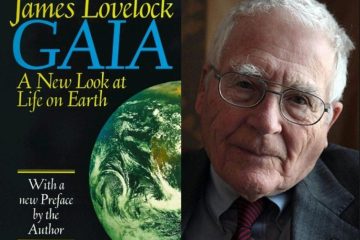In the realm of environmental science and Earth’s intricate ecosystems, one name shines brightly — James Lovelock. Known for his groundbreaking Gaia hypothesis, Lovelock’s perspective on our planet as a living, self-regulating entity has sparked a paradigm shift in how we perceive the Earth. Join us on a journey to delve into the captivating world of James Lovelock and his revolutionary concept of the Living Earth.
Table of Contents
- Unveiling the Life and Work of James Lovelock
- Exploring the Gaia Hypothesis and its Implications
- Analyzing Lovelock’s Impact on Environmental Science
- Recommendations for Applying Lovelock’s Concepts in Today’s World
- Q&A
- Closing Remarks

Unveiling the Life and Work of James Lovelock
Delve into the captivating world of James Lovelock, where science and environmentalism intertwine to form a unique perspective on our living Earth. Through his groundbreaking research and revolutionary Gaia hypothesis, Lovelock has reshaped our understanding of the interconnectedness of all life forms on our planet.
Explore the intricate web of relationships between organisms and their environment as you journey through Lovelock’s life’s work. From his early days as a budding scientist to his current status as a renowned environmental thinker, each discovery and theory he has unveiled sheds light on the complexity and fragility of our planet’s ecosystems.

Exploring the Gaia Hypothesis and its Implications
In the realm of environmental science and ecological theories, the Gaia Hypothesis stands as a thought-provoking concept that challenges conventional perspectives on the Earth as a living entity. Coined by James Lovelock, this hypothesis suggests that the Earth functions as a single organism, self-regulating and maintaining conditions favorable for life.
By viewing the Earth as a self-sustaining system, interconnected and interdependent, the Gaia Hypothesis opens up discussions about the intricate balance within nature and the impact of human activities on this delicate equilibrium. This perspective sparks contemplation on our role as stewards of the planet and prompts reflection on how our actions can either support or disrupt the harmonious functioning of Earth as a living organism.
Analyzing Lovelock’s Impact on Environmental Science
James Lovelock, the visionary scientist behind the Gaia theory, has left an indelible mark on the field of environmental science. His holistic approach to studying the Earth as a living, self-regulating organism has sparked a paradigm shift in how we perceive our planet.
Through his groundbreaking work, Lovelock has challenged traditional scientific views and emphasized the interconnectedness of all living and non-living entities on Earth. His concepts have not only influenced environmental science but have also inspired a new way of thinking about the intricate balance of nature.

Recommendations for Applying Lovelock’s Concepts in Today’s World
Exploring the principles of Lovelock’s Gaia theory unveils a world where the planet is seen as a living organism, constantly interacting and regulating its own processes. Applying this perspective in today’s context can offer valuable insights into how we approach environmental challenges and sustainability.
Embracing Lovelock’s concepts can encourage a shift towards holistic thinking and interconnectedness with nature. By acknowledging the Earth as a self-regulating system, we can make informed decisions that prioritize harmony between human activities and the planet’s well-being.
- Collaboration: Foster collaborations between different sectors to address environmental issues collectively.
- Renewable Energy: Invest in renewable energy sources to align with the Earth’s natural cycles.
- Biodiversity Preservation: Protect and restore ecosystems to maintain the Earth’s balance.
Q&A
Q: Who is James Lovelock and what is the concept of the living earth?
A: James Lovelock is an independent scientist and environmentalist who introduced the Gaia hypothesis, suggesting that the Earth is a living, self-regulating organism. The concept proposes that the Earth’s biosphere, atmosphere, oceans, and soil form a complex interacting system that maintains the conditions necessary for life.
Q: How does the living earth concept impact environmental awareness?
A: The idea of the living Earth highlights the interconnectedness of all living and non-living elements on our planet. It fosters a deeper understanding of the Earth as a fragile and interconnected ecosystem, promoting environmental stewardship and inspiring sustainable practices to protect our planet.
Q: What are some criticisms of the Gaia hypothesis?
A: Critics of the Gaia hypothesis argue that attributing Earth-like qualities to the planet anthropomorphizes it, leading to a simplistic view of complex ecological systems. Some also question the scientific rigor and testability of the hypothesis, challenging its validity within mainstream scientific circles.
Q: How has James Lovelock’s work influenced the field of environmental science?
A: James Lovelock’s contributions have had a significant impact on the field of environmental science by prompting researchers to reevaluate their understanding of the Earth as a dynamic and interconnected system. His work continues to inspire new research directions and perspectives on sustainability and planetary health.
Closing Remarks
In conclusion, James Lovelock’s concept of the living Earth offers a thought-provoking perspective on the interconnectedness of our planet and the delicate balance that sustains life as we know it. By viewing Earth as a self-regulating, complex system, Lovelock challenges us to reevaluate our relationship with the environment and embrace a more holistic approach to environmental stewardship. As we ponder the implications of Lovelock’s theory, may we find inspiration to cultivate a deeper appreciation for the remarkable web of life that surrounds us and to strive towards a future where harmony between humanity and the living Earth is not just a vision but a reality we actively nurture. Join us as we continue to explore the wonders of our planet and the enduring wisdom of James Lovelock’s profound insights into the intricate dance of life on Earth.



0 Comments